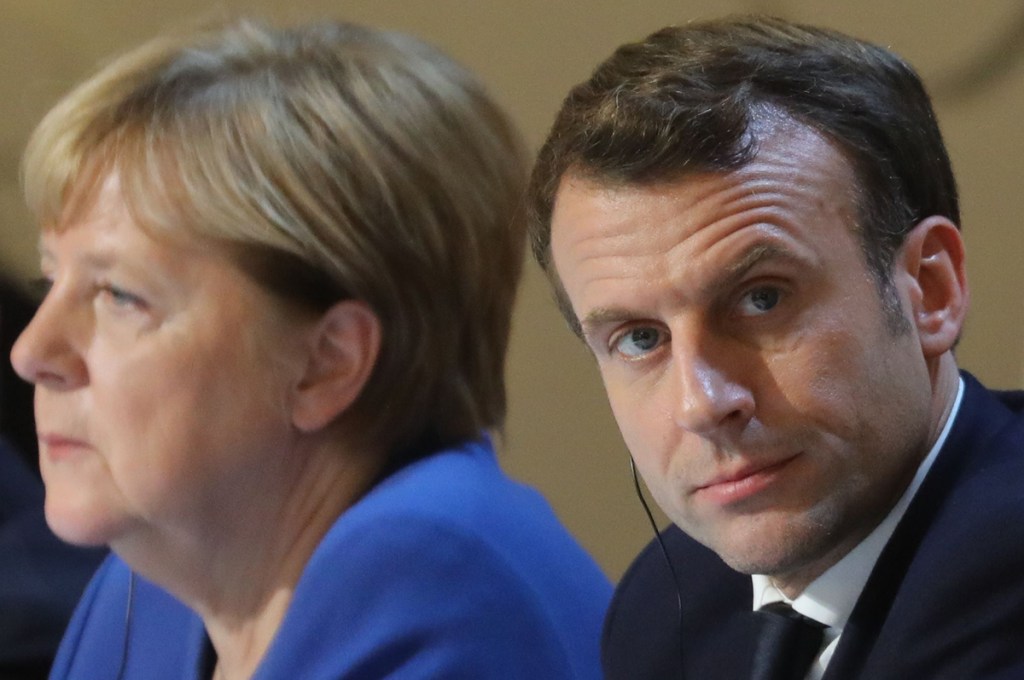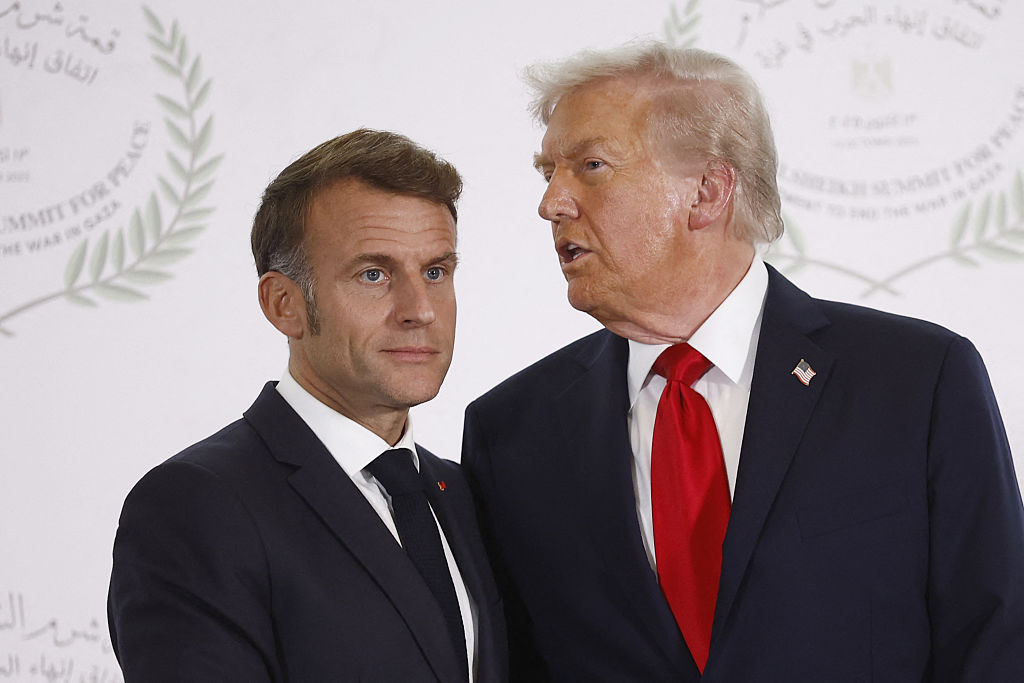The familiar should be a consolation amid the terrible novelties of COVID-19, but the pandemic’s effects on the European Union threaten to turn familiar fiasco into dangerous novelty. As a weakened Angela Merkel faces Germany’s crisis of economic responsibility, and France floats the idea of issuing its own ‘corona bond’, the EU and its currency face what Emmanuel Macron would probably not want to call its Waterloo.
Henry Kissinger’s remark — ‘Who do I call if I want to speak to Europe?’ — has never seemed more true. Britain is leaving. France and Germany are at odds, with France emerging as the patron of the debt-stricken southern states and Germany, the dominant eurozone economy, wanting all the profit and none of the responsibility.
As the eurozone went off a cliff, the only unified European response to the outbreak of coronavirus was to ignore Italy’s call for help. In mid-March, Italy, its medical supplies exhausted, triggered the EU’s civil protection mechanism. Olaf Scholz, Germany’s finance minister, dismissed pan-EU action as ‘premature’. Not one of its euro-friends came to Italy’s assistance.
The German government promised credit guarantees worth €550 billion ($600 billion) to German companies. In France, Emmanuel Macron also promised to prop up private firms. But how many other EU states can credibly promise that, let alone afford it?
Not Greece, which is already effectively a bankrupt German satellite. Not Italy, which the epidemic has rendered effectively bankrupt all over again, placing it danger of Germany annexing its economy. Not Spain or Portugal, which are heading the same way.
The alliance of France and Germany is supposed to be the cornerstone of the Union. But when Emmanuel Macron calls for issuing a common eurozone ‘coronabond’, Angela Merkel refuses.
Macron seeks to use this crisis to force the final, perennially deferred stage of European union: turning the European Central Bank into something along the lines of the Federal Reserve after 1910, firing up the economies of southern Europe through debt mutualization and — crucially — printing money as the US is doing.
This would allow France a hand in spending Germany’s profits from its trade with the southern states. But Germany has painful historical memories about the political effects of debt — admittedly, less painful than the rest of Europe’s memories — and wants the profits of a consolidated European market, not the debts of the southern states. Merkel has said she would never accept debt mutualization ‘as long as I live’. The German high court has helpfully ruled that issuing pan-EU bonds would require a changing the German constitution.
This, Merkel’s ministers agree, is a problem for Brussels, not Berlin. On April 1, the Bundesbank, Germany’s central bank, declared against mutualizing eurozone debt through a shared ‘coronabond’. Instead the Bundesbank has kicked the problem back to Brussels, the ECB and its European Stability Mechanism (ESM), an emergency loan fund. The ESM is the thumbscrew which keeps the Greeks in debt. The Italians are in hurry to put out their hands. Claudio Borghiu, economic with the Lega party, rejects the ESM as a political ‘coercion mechanism’.
The economic and political strands of this problem are inseparable because they are identical. The development of the European superstate is stalled, and the failure to create a bank at its core like the Federal Reserve or the Bank of England is both a symptom and cause. The ECB is weak not by accident, but by design. The member states retain enough just enough power to keep the European Central Bank just weak enough, so there is no single market, only a mass of small national markets using the same currency. If they are not fortunate enough to be dependent upon Germany as economic partner (France) or patron (the Netherlands), they are unfortunate enough to be caught in Germany’s punitive and unpopular debtor’s prison.
The same applies at the political level. Like that other failed polyglot enterprise the Austro-Hungarian empire, the EU has two capitals. These are not Brussels and Strasbourg, though to satisfy France the EU parliament decamps from Brussels to Strasbourg annually like some medieval prince on progress. Nor, despite the claims of French presidents and prime ministers from de Gaulle to Macron, are they Paris and Berlin. The EU’s two capitals are Brussels and Berlin. Everyone knows which one calls the shots.
The EU may have been founded on the alliance of France and Germany, but it has grown and functioned through the alliance of Brussels’s fantasy political echelon with the fact of German economic might. Until the eurozone sovereign debt crisis of 2009, the Napoleonic dreams of the bureaucrats in Brussels remained in rough harmony with the Bismarckian responsibilities of the politicians in Berlin. Brussels wanted to build a single European state, and Berlin wanted to rule the single European market within its zollverein (customs border). But power carries responsibilities.
In 2009, Germany was irresponsible. The sovereign debt crisis has not ended. Its German-imposed punishment by debt schedules drags on, poisoning trust and paralyzing economies, feeding nationalist and anti-EU parties across the eurozone. Southern Europe enters the coronavirus recession after a lost decade of German-imposed debt schedules.
Merkel’s government was no less irresponsible when the crisis of immigration and borders came in 2015. This time, the German lesson to be taught was not fiscal probity but humanitarian tolerance. Instead of listening to her neighbors and allies, Merkel grandstanded. She declared that the gates of Europe were open and that all states must accept their fair share of immigrants. Frontline states like Hungary, Italy and Greece understood that they were on their own. The border fences went up. The free movement of EU citizens is now decoupled from the circulation of the EU’s currency.
Naturally, the EU also calls for debt mutualization, as that means centralizing fiscal authority. This is the development without which the EU cannot become a single state economically. But this is also the fate which no EU public or national parliament, the Germans included, would ever choose by democratic vote. Hence the current absurdity. Germany can afford it, but will neither pay nor assent to an economic policy set by Brussels. The ECB in Brussels can only afford it with Germany’s permission, and it lacks political power.
All this must seem impossibly distant from Brussels. The leaders of the EU have weightier historical matters on their narrow minds than democratic objections from the Mediterranean margins. For voters across Europe, however, the European Union is again exposed not as a reunion of ancient allies or a rapprochement of recent enemies, but as a fair-weather friendship on Germany’s terms. And national leaders like Emmanuel Macron cannot afford to ignore public opinion.
The post-2009 radicalization of nationalist politics was already well advanced in not just Italy and Greece, but also Spain and France. The coronavirus recession will accelerate that. It has raised fiscal tensions between Berlin and Brussels, and now it has created new tensions between Berlin and Paris.
Habitual observers of the slow decline of the EU expected the crisis to come from a run on the euro currency, or the election of a pro-secession government, or a German refusal to underwrite debts and loans. A French threat to issue a French corona bond was unforeseen. It increases the chances of a two-tier eurozone, an expensive, German zone and a cheaper, French zone. That would divide the EU according to language and culture: the debt-conscious, northern speakers of Germanic languages with the debt-enamored southern speakers of Romance languages. But the economic realities that reflects would also become political ones.

























